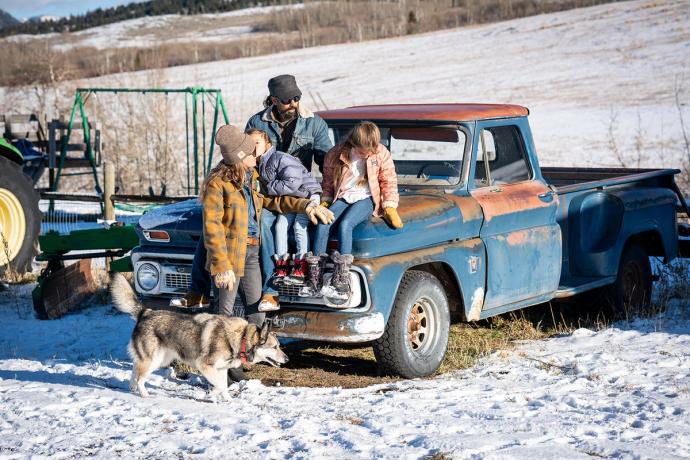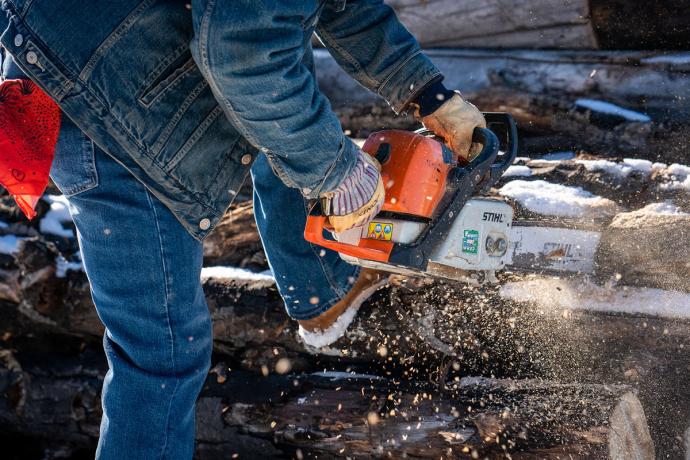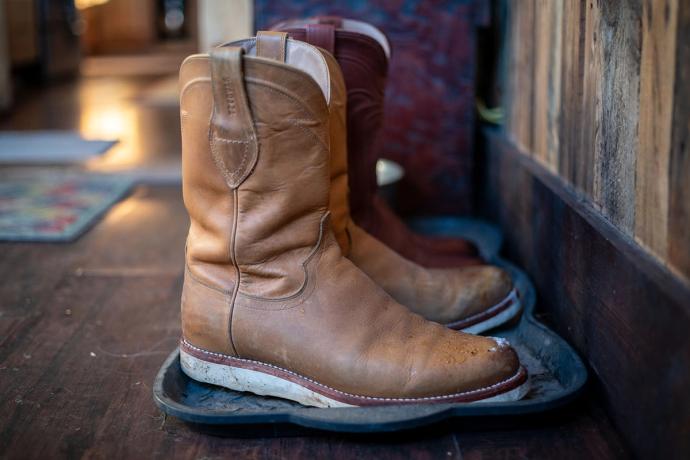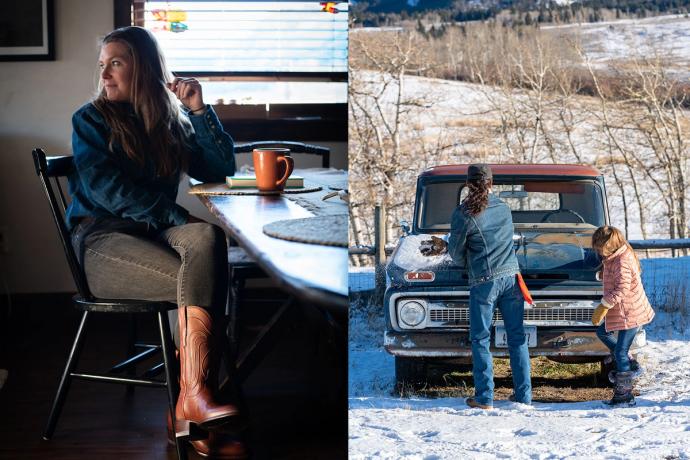
The letters were big and blocky with one word tumbling into the next. The bright yellow highlighter ink and mismatched capital letters didn’t make it any easier to read, but the message was clear enough:
“Animals, I hope the elk stay alive!”
Even five-year-old Hasell Ramirez, the daughter of Andres “Dre” Ramirez and Malou Anderson-Ramirez who wrote that simple plea, understands she plays an important role in speaking out for others.
“We have privilege,” says Malou who grew up in the remote Tom Miner Basin of Southwestern Montana and has dedicated much of her adult life to improving ecosystems, evolving the predator-prey relationship, and sharing her experiences with others. “But we get to decide what we want to do with that privilege.”

Malou grew up on the same ranch her grandparents purchased after World War II that sits along the northern border of Yellowstone National Park. Though boarding school, college, and multiple jobs took her off the ranch for many years, in 2011 she and her husband, Dre, decided to make it their family home. Two daughters soon followed.
Malou busies herself around the kitchen preparing fresh tea and homemade bran muffins in their cozy stone and timber abode located in the shadow of her childhood home.
“The resident elk herd used to be over 100 strong,” she remarks. “It shrunk to a couple dozen soon after the wolves were reintroduced to Yellowstone while elk hunting was still heavy. But with better wildlife management practices, a more informed elk hunting quota and healthier ecosystem, they’ve rebounded again and are doing great. We may even hunt one this winter for food storage, and we haven’t done that in years!”
The Ramirez family doesn’t take the act of killing an animal lightly. Though Malou’s family grew up hunting these hills, she sees every animal, bush, tree, and human as parts of the greater ecosystem.

“Each of us plays a role,” she says. “I hope I can be a voice for the voiceless.”
Malou’s work in the valley has seen its fair share of public spotlight. She’s actively engaged in encouraging her ranching neighbors to co-exist with the predators that roam the basin. She co-founded the Tom Miner Basin Association to do just that. Through the Common Ground Project, an organization and place for retreats, workshops and gatherings, Malou helps people connect with the natural world via equine-assisted therapy. On days when she’s not considering the future of wolves and grizzly bears or guiding people through their own healing , she works on her family ranch or lends a helping hand to hard-working friends and family.
“I’m still exhausted from helping my brother preg-test over 300 cows.” Malou says days after the ordeal. “But I couldn’t stop thinking that there’s got to be a better way to do this!”
Malou’s thoughts and work are constantly occupied with innovations, plans and ideas. She’s currently working towards a more efficient and low-stress way to manage cattle utilizing affordable tech. If it’s not one project, there’s bound to be another.





Dre’s journey to this basin has taken several twists and turns while his path has also shown constant vigilance to the interconnected world around him. Growing up in Texas, he learned to appreciate the beauty and abundance of the outdoors but preferred indoor sports as a kid.
“I was never into hunting,” he remarks casually.
Dividing his time between divorced parents from a young age took a toll on Dre, so when he decided to live with his dad, his relationship with some close family members suffered. Perhaps it was learning to handle difficult emotions or navigating challenging relationships that led him to a job in Southern California working with youth struggling with behavioral issues.
“We were their last hope,” he tells me, referring to the hoops and challenges each child and family went through to arrive at that program. “Some of these kids couldn’t even talk.”
Dre found meaning in providing a voice for these vulnerable youth.
It was at this demanding job on the shores of Southern California where Dre and Malou first met. Long, exhausting days would often end at the local bar as they let off steam and the emotional weight of the day, likely bonding the pair through shared trauma.
The tenor of the Ramirez home is warm and calm. A wool tapestry Malou made adorns a side table. Framed family photos and snapshots of their two girls, Hasell, five-years-old, and Esmé, seven-years-old, decorate the walls. A cat sneaks under a sofa. Freshly cut firewood rests next to an active wood stove. It’s obvious Malou knows her way around their warm and cozy kitchen in the mountains. She breezes through pulling muffins from the oven to warming herbal tea for the kids, never missing a beat.
“Dre installed this kitchen countertop this morning,” she says as she smooths her hands across the shiny black wooden surface.
“We needed a new countertop,” Dre responds as if it’s no big deal to casually install a finely crafted centerpiece of a home in a morning.
Dre has made the history of the land and these mountains his livelihood as his daily grind currently consists of restoring old log “chink and mortar” homes around Southern Montana. His work breathes new life to old homes. In a way, he continues to provide a voice for forgotten architectural history – another voiceless member of history.

“I just get into this flow state that’s so peaceful and fulfilling,” he says with a smile.
Dre, forever the one to shy away from the spotlight, has found a real niche and passion hidden in these hills. The wooden countertop must have been a seemingly simple job for a man whose first project consisted of building an entire house from scratch.
“I watched a lot of YouTube videos,” he casually tells me while looking out the window into the snowy mist at his finely crafted creation.
The icicles are starting to melt as the afternoon sun shines warm on the western slope. The girls are playing outside and chasing the dogs around the ranch. Their squeals and laughter let us know everything is alright.
Dre takes this moment of solitude to stretch his body and allow his tired muscles to relax. His eyes are closed, and his mind is alert. His presence is calming and sure.

I look at Malou and she continues to hustle around the kitchen. More tea. Muffins. Bread. Treats. Her’s is a life committed to the other. Dre seems focused on diligent learning and committed growth. I see how working with his hands and the land has given him a sense of deep satisfaction in tackling creative challenges. Malou remains the advocate for the animals, for the land, and finally, for her own family.
The girls return with flushed cheeks and enormous smiles. They rattle off their adventures of the last hour and find warmth within the calming presence of their parents, the glowing fire and the fresh tea.
Casually, Hasell remarks there are 200 white tigers left in the world. She seems concerned about these surviving tigers and wants to learn more about them. Her backyard species aren’t the only ones she’s looking out for. She may be following closely in the path of her parents.
As I prepare to drive back home for the evening, I take a quick detour up the Tom Miner Basin to see if I can spot any animals in the decreasing light. Sure enough, a herd of elk stands alert on a nearby hillside. Their tan hides look thick in preparation for the winter months and their bodies robust from feeding on native grasses all summer long. A little farther up, a grizzly bear saunters in a field searching for the food that will bulk up his body and carry him through the dark winter. I smile because I know their voices will carry over the hills and through the valleys. Because of others’ commitment, no longer are they counted among the voiceless.
Credits
Produced by
Modern Huntsman, @modernhuntsmanStory by
Paige Southwood, @heypaigePhotos by
Tyler Sharp, @tylersharpphotoFeaturing
Jillian Lukiwski, @thenoisyplume